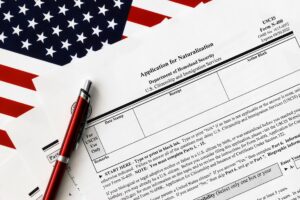If you come from an eligible country, the Diversity Visa (DV) program can enable you to live and work in the US. This guide focuses on how you, as a Diversity Visa Holder, can bring your spouse and children to the U.S. as dependents. You can best prepare for this by understanding the application procedure, eligibility criteria, required documentation, and other elements of the DV program process.
Understanding the Diversity Visa Program
The Diversity Visa (DV) program was established by the Immigration Act of 1990. It allows for the inclusion of immigrants from countries with rates of immigration to the United States as outlined in Section 203(c) of the Immigration and Nationality Act (INA). The DV Program is administered annually by the Department of State (DOS), offering 55,000 Diversity Visas during the year 2023. Registering for the DV program is free of charge.
To qualify for a DV, selected applicants (known as selectees) must meet straightforward eligibility criteria. The DOS randomly selects selectees through a computer drawing. Allocates diversity visas among six regions.
Which Family Members Qualify as Dependents Under the Diversity Visa?
If you win the DV lottery, U.S. Immigration law allows you to extend this benefit to your spouse and unmarried children under 21 years old. This enables all family members to apply for U.S. green cards (lawful permanent residence). Your spouse and children are referred to as dependents. They should be listed on your online State Department application, commonly known as your entry. However, it’s important to note that your parents and siblings are not eligible for DV visas as dependents and should not have been included in your entry.
Adding Dependents to Your Diversity Visa Application
Your application will need to include the name, date, and place of birth of your spouse and all of your non-U.S.-born children. This includes all adopted children and step-children. You must list a child even if you are no longer married to the other parent. You must include your spouse’s information even if you’re planning to get a divorce. You aren’t required to list a spouse or child who is already a U.S. citizen or a lawful permanent resident (green card holder). But it is a good idea to list that person, particularly if you have any doubt about their U.S. immigration status.
If you neglect to include your spouse or a child, they will not be eligible for a diversity visa. If you do not list your spouse and all children who are unmarried and under 21 at the time you fill out your online diversity visa application, you will be disqualified and everyone listed in your application will be denied visas at the time of the visa or green card interview.
Listing a family member on your application does not mean that they must come to the United States with you. Any person listed on the application has the choice to remain behind or, in some cases, to enter later.
Documentation Needed For Your Diversity Visa
During fiscal year 2024, you will not need to submit this documentation with your DV program application form. Instead, you will need to submit them to the consulate where your interview will occur. At your interview, to document your familial relationships for all of the dependents you have listed on your application, you will need to have the following documents on hand, which must be accurate and translated into English:
- Birth certificates
- Adoption decrees and custody agreements, where applicable
- Marriage certificate
- Divorce certificate if you have been married previously
In addition, you must bring the following for yourself and each of the family members listed on your visa petition:
- Their current passport. Each passport should have at least eight months remaining validity as of the day of issuance.
- A police certificate from the country or countries in which they have lived for six months or more after turning 16 years of age.
- Court and prison records if you or they have ever been arrested, detained, or convicted of a crime—even if the charges were ultimately dismissed or you were granted amnesty or pardoned.
- Original military discharge or release certificates where applicable.
- Evidence that you’ll be able to financially support yourself and your family while in the U.S., including evidence of income, savings, investments, or other assets.
- Photos for each family member.
- Appointment information is printed from the Entrant Status Check on the E-DV website.
- DS-260 confirmation page. You can print this from the Consular Electronic Application Center any time after you complete your DS-260 application.
Processing Fees For Your Diversity Visa
You must pay a non-refundable immigrant visa fee—currently $330 per person—in addition to the fee required to file your I-130 Petition for Alien Relative. If you have not paid this fee in the US, you must pay it to the consular cashier before you will be interviewed by a consular officer.
Your Diversity Visa Interview
After your application has been reviewed, you’ll receive an e-mail from KCC to let you know that an interview has been scheduled at the U.S. Embassy or Consulate you selected on your DS-260 form. The e-mail will instruct you to log into your Entrant Status Check on the Electronic Diversity Visa (E-DV) website using your DV entry confirmation number to view the date, time, and location of your interview. Print this information to take with you to your interview. You will need to be present at the interview, as well as your spouse and children (as applicable) who are applying for a diversity immigrant visa.
After you have been notified of your scheduled interview, you will need to take the following important steps in advance of the interview date:
- Carefully review your scheduling information in the Entrant Status Check on the E-DV website, noting the date, time, and location of your immigrant visa interview.
- Review U.S. Embassy or Consulate interview instructions. There may be additional instructions provided by the U.S. Embassy or Consulate where you will be applying and being interviewed, so you should review those instructions carefully.
- Schedule and complete a medical examination. You (and each family member applying for a visa with you) are required to schedule a medical appointment with an authorized physician in the country where you will be interviewed. You must complete your medical examination, along with any required vaccinations, before your scheduled visa interview date. When your medical exam is completed, if you are given a medical exam envelope, you must bring it sealed (not opened) to your visa interview. Some physicians will send the medical exam results directly to the embassy or consulate. You must contact an authorized physician for the U.S. Embassy or Consulate where you will apply and schedule your medical appointments. The embassy or consulate will not do this for you. You need to explain to the physician that the examination is for an immigrant visa application and give the physician the date of the interview appointment.
Why You Should Hire an Immigration Attorney
Hiring legal assistance can help you when bringing your dependents to the U.S. on your Diversity Visa. An experienced immigration attorney can help you prepare and review your documents, reducing the risk of errors that could lead to delays or denials. They can also give you advice and ensure you and your family are prepared for your consular interview
Contact an Immigration Attorney
Do you have questions about how to bring your family to the U.S. on your Diversity Visa? Then contact US Immigration Law Counsel through our website or by calling 1-800-666-4996. We deal with the government so you don’t have to. We look forward to helping you at this time.






